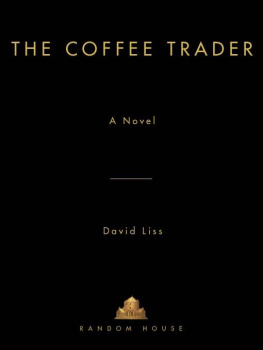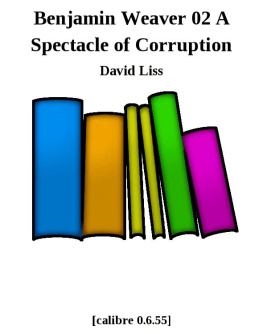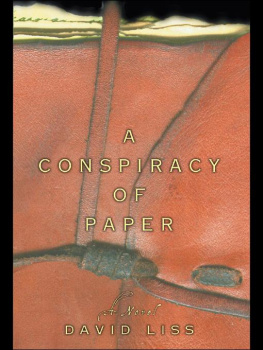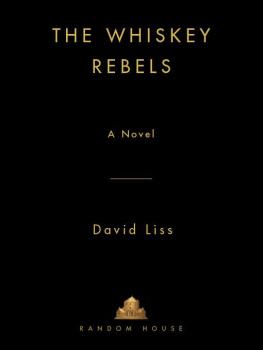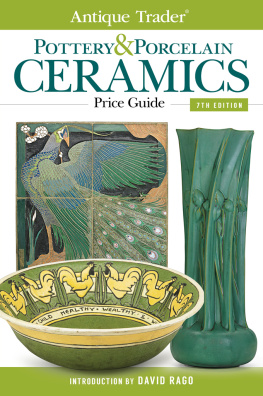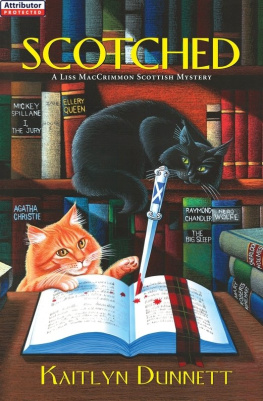David Liss - The Coffee Trader: A Novel
Here you can read online David Liss - The Coffee Trader: A Novel full text of the book (entire story) in english for free. Download pdf and epub, get meaning, cover and reviews about this ebook. year: 2003, publisher: Random House, genre: Detective and thriller. Description of the work, (preface) as well as reviews are available. Best literature library LitArk.com created for fans of good reading and offers a wide selection of genres:
Romance novel
Science fiction
Adventure
Detective
Science
History
Home and family
Prose
Art
Politics
Computer
Non-fiction
Religion
Business
Children
Humor
Choose a favorite category and find really read worthwhile books. Enjoy immersion in the world of imagination, feel the emotions of the characters or learn something new for yourself, make an fascinating discovery.
- Book:The Coffee Trader: A Novel
- Author:
- Publisher:Random House
- Genre:
- Year:2003
- Rating:5 / 5
- Favourites:Add to favourites
- Your mark:
- 100
- 1
- 2
- 3
- 4
- 5
The Coffee Trader: A Novel: summary, description and annotation
We offer to read an annotation, description, summary or preface (depends on what the author of the book "The Coffee Trader: A Novel" wrote himself). If you haven't found the necessary information about the book — write in the comments, we will try to find it.
The Coffee Trader: A Novel — read online for free the complete book (whole text) full work
Below is the text of the book, divided by pages. System saving the place of the last page read, allows you to conveniently read the book "The Coffee Trader: A Novel" online for free, without having to search again every time where you left off. Put a bookmark, and you can go to the page where you finished reading at any time.
Font size:
Interval:
Bookmark:
Acknowledgments
Novels are by no means solitary pursuits, and this book could never have happened without the help of many wonderful people.
My first and heartiest thanks go to those who offered me their time and knowledge: J. W. Smit, Deby Abram, Henk Reitsma, Harko Keijzer, and the staff of the Jewish Historical Museum of Amsterdam. I cannot sufficiently thank Rienk Tychon, Thille Dop, and everyone at the offices of Uitgeverij Luitingh-Sijthoff, who made my research in the Netherlands infinitely more productive and enjoyable. Samantha Heller and Sue Laizik read early versions of the novel, and their suggestions were invaluable.
Once again, I am in debt to the people at Random House, particularly Dennis Ambrose, Robbin Schiff, and, of course, my editor Jonathan Karp, whose guidance, enthusiasm, and superhuman editing make my work so much more manageable. And I am eternally grateful to my agent, Liz Darhansoff, and everyone at Darhansoff, Verrill and Feldman for their ceaseless efforts.
It would be impossible to catalog the reasons I am indebted to my friends and familythe support, the enthusiasm, and, perhaps most important, the willingness to listen while I thought out loud. Still, I must point out that this book owes a great deal to the kindness, patience, as well as the sometimes smarting honesty of my wife, Claudia Stokes. Thanks for making me do that rewrite. Our daughter, Eleanor, provided unceasing inspiration with her silliness and inexhaustible supply of good cheer. She motivated me in a thousand ways on a thousand occasions. And Im grateful to Tiki, the orange foundling, for showing up at just the right time.
ALSO BY
DAVID LISS
A Conspiracy of Paper
ABOUT THE AUTHOR
DAVID LISS is the author of A Conspiracy of Paper, winner of the 2000 Edgar Award for Best First Novel. He has a graduate degree in English literature from Columbia University. He holds an M.A. degree from Georgia State University and a B.S. degree from Syracuse University. He lives in San Antonio with his wife and daughter and can be reached via his website, www.davidliss.com.
Works Consulted
Allen, Stewart Lee. The Devils Cup: Coffee, the Driving Force in History. New York: Soho Press, 1999.
Barbour, Violet. Capitalism in Amsterdam in the 17th Century. Ann Arbor: University of Michigan Press, 1950.
Bloom, Herbert I. The Economic Activities of the Jews of Amsterdam in the Seventeenth and Eighteenth Centuries. Williamsport, Penn.: Bayard Press, 1937.
Bodian, Miriam. Hebrews of the Portuguese Nation: Conversos and Community in Early Modern Amsterdam. Bloomington: Indiana University Press, 1997.
Boxer, C. R. The Dutch Seaborn Empire, 16001800. New York: Alfred A. Knopf, 1965.
Braudel, Ferdinand. Civilization and Capitalism, 15th18th Century. 3 vols. Trans. Sian Reynolds. Berkeley: University of California Press, 198184.
Chancellor, Edward. Devil Take the Hindmost: A History of Financial Speculation. New York: Farrar, Straus and Giroux, 1999.
de Vries, Jan, and Ad van der Woude. The First Modern Economy: Success, Failure, and Perseverance for the Dutch Economy, 15001815. Cambridge, England: Cambridge University Press, 1997.
Gitlitz, David M. Secrecy and Deceit: The Religion of the Crypto-Jews. Philadelphia: Jewish Publication Society, 1996.
Gluckel of Hameln. The Memoirs of Gluckel of Hameln. Trans. Marvin Lowenthal. New York: Schocken Books, 1977.
Gullan-Whur, Margaret. Within Reason: A Life of Spinoza. New York: St. Martins Press, 1998.
Israel, Jonathan I. An Amsterdam Jewish Merchant of the Golden Age: Jeronimo Nunes Da Costa (16201697), Agent of Portugal in the Dutch Republic. Studia Rosenthaliana 18.1 (1984): 2140.
. The Changing Role of the Dutch Sephardim in International Trade, 15951715. In Dutch Jewish History: Proceedings on the Symposium on the History of the Jews in the Nether-lands, November 28December 3, 1982, Tel-Aviv, Jerusalem, ed. Jozeph Michman, 3150. Tel-Aviv: Hebrew University of Jerusalem, 1984.
. Dutch Primacy in World Trade, 15851740. Oxford, England: Clarendon Press, 1989.
. European Jewry in the Age of Mercantilism, 15501750. 3d ed. London: Littman Library of Jewish Civilization, 1998.
Jacob, Heinrich Eduard. Coffee: The Epic of a Commodity. Trans. Eden and Cedar Paul. New York: Viking Press, 1935.
Jardine, Lisa. Worldly Goods: A New History of the Renaissance. New York: W. W. Norton, 1996.
Mak, Geert. Amsterdam: A Brief Life of the City. Trans. Philipp Blom. London: Harvill Press, 1999.
Nadler, Steven. Spinoza: A Life. Cambridge, England: Cambridge University Press, 1999.
Netanyahu, B. The Marranos of Spain: From the Late 14th to the Early 16th Century, According to Contemporary Hebrew Sources. 3d ed. Ithaca, N.Y.: Cornell University Press, 1999.
North, Michael. Art and Commerce in the Dutch Golden Age. Trans. Caroline Hill. New Haven: Yale University Press, 1997.
Pendergrast, Mark. Uncommon Grounds: The History of Coffee and How It Transformed Our World. New York: Basic Books, 1999.
Regin, Deric. Traders, Artists, Burghers: A Cultural History of Amsterdam in the 17th Century. Amsterdam: Van Gorcum, 1976.
Roth, Cecil. A Life of Menasseh Ben Israel: Rabbi, Printer, and Diplomat. Philadelphia: Jewish Publication Society, 1934.
Safley, Thomas Max. Matheus Millers Memoir: A Merchants Life in the Seventeenth Century. New York: St. Martins Press, 2000.
Schama, Simon. The Embarrassment of Riches: An Interpretation of Dutch Culture in the Golden Age. New York: Vintage Books, 1987.
Schivelbusch,Wolfgang. Tastes of Paradise: A Social History of Spices, Stimulants, and Intoxicants. Trans. David Jacobson. New York: Pantheon, 1992.
Swetschinski, Daniel Maurice. The Portuguese Jewish Merchants of Seventeenth-Century Amsterdam: A Social Profile. Ph.D. diss., Brandeis University. Ann Arbor: UMI Dissertation Services, 1980.
Temple, Sir William. Observations upon the United Provinces of the Netherlands. The Works of Sir William Temple, Bart. Vol. 1, 31203. London, 1814; Greenwood Press repr., 1968.
Van Deursen, A. T. Plain Lives in a Golden Age: Popular Culture, Religion and Society in Seventeenth-Century Holland. Trans. Maarten Ultee. Cambridge, England: Cambridge University Press, 1991.
Vega, Joseph de la. Confusion de Confusiones: Portions Descriptive of the Amsterdam Stock Exchange. 1688. Trans. and ed. Hermann Kellenbenz. Boston: Baker Library, 1957.
Westermann, Marit. A Worldly Art: The Dutch Republic, 15851718. New York: Harry N. Abrams, 1996.
Zumthor, Paul. Daily Life in Rembrandts Holland. Trans. Simon Watson Taylor. Stanford, Calif.: Stanford University Press, 1994.
Historical Note
If business and commerce in the Dutch golden age conjure up any image for most people today, it is that of the trade in paintings, which were regarded mostly as aesthetically pleasing commodities rather than objects of art, or of the tulipomania, the crazed tulip market of the 1630s, which was so recently mirrored in our own dotcom bubble. I was drawn to business in the period, however, because of its sheer innovation. If it would be overstating the case to say that business as we know it came into being in the Netherlands in the seventeenth century, it would be fair to propose that modern business saw its origins in that time and place. The Dutch developed new methods of tradethe joint stock company, commodities markets, futures, stocks, and other forms of speculative tradingmostly because they had to. Coming out of a bitter and protracted war of independence against Spain, the Dutch of the seventeenth century found themselves with very little of any particular value other than their business sense, and with this commercial drive they transformed their nation into one of the most powerful in Europe.
Next pageFont size:
Interval:
Bookmark:
Similar books «The Coffee Trader: A Novel»
Look at similar books to The Coffee Trader: A Novel. We have selected literature similar in name and meaning in the hope of providing readers with more options to find new, interesting, not yet read works.
Discussion, reviews of the book The Coffee Trader: A Novel and just readers' own opinions. Leave your comments, write what you think about the work, its meaning or the main characters. Specify what exactly you liked and what you didn't like, and why you think so.

